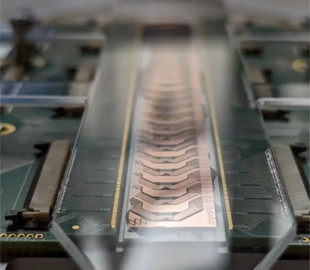
Milan startup has opened the world's first production of glass-based quantum photonic chips. With the support of NATO, the Ephos company aims to build infrastructure for quantum applications based on the US and the EU.
NATO-backed startup Ephos announced today that it has begun production of glass-based quantum photonic chips, a world first the startup says. These chips can provide quantum applications in computing, sensors and communication, as well as improve the performance of classical computing.
Founded in 2022, Ephos has developed its own manufacturing process that allows it to move away from silicon and create photonic chips with glass substrates – the same material used in optical fibers. Photonic chips use photons (simplified – tiny particles of light) to transmit and process information. They also rely on optical fibers to provide connections to other optical components on the chip or to interface with devices such as sensors.
"We work with the same material used in optical fibers, because light transmission is most efficient within a single material", – Andrea Roccetto, co-founder and CEO of Ephos, told TNW. "By performing calculations on the same substrate through which light passes, we minimize signal loss".
Signal loss is the main problem in the creation of quantum computers. "Quantum information, for example, encoded in photons, cannot be copied, – says Roccetto. “Therefore, when the signal is lost at too high a rate, it renders the quantum computer inoperable.” According to Roccetto, the startup's technology reduces signal loss by a factor of 20 per chip face compared to industry standards for photonic chips. "And since the number of chips can be very large in a modular architecture, the overall advantage provided by Ephos chips can ultimately increase by orders of magnitude", – he said.
200% Deposit Bonus up to €3,000 180% First Deposit Bonus up to $20,000Ephos manufactures its chips entirely in-house, which Roccetto called a “unique advantage.” "Our new factory makes Ephos one of the few quantum hardware companies with complete control over the manufacturing process". The startup's supply chain is also based entirely in the EU and the US.
Ephos' focus on such strategic technology, as quantum, combined with the ability to produce it in the West, naturally attracted the attention of NATO. In 2023, the company joined the first cohort of NATO Defense Innovation Accelerator in the North Atlantic (DIANA). In September of this year, it also received €450,000 undiluted funding under the program.
The initiative supports companies that develop dual-purpose technologies – those that can have both civilian and military applications. Quantum is one such company that is ready to create advanced sensing and communication systems for defense and security. According to Roccetto, Ephos is in line with DIANA's mission to "create the necessary infrastructure for the future of computing".
Yesterday, the startup also announced that it had raised $8.5 million in seed funding. The capital helped accelerate the launch of a new manufacturing complex located in the Milan Innovation District (MIND). He will also support the operations and expansion of the team in San Francisco. The round of financing was led by the American company Starlight Ventures. A number of venture capital firms, such as Collaborative Fund and Exor Ventures, as well as angel investors Joe Zeid (former vice president of Airbnb) and Diego P’iachencini (former senior vice president of Amazon) also participated in the investment.

